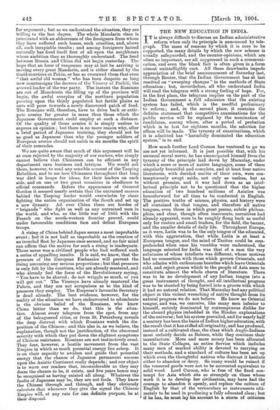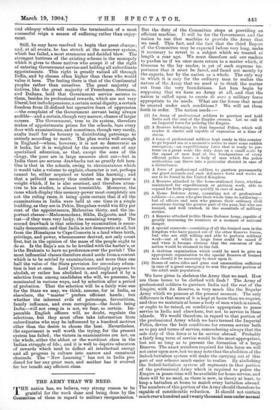THE NEW EDUCATION IN INDIA.
IT is always difficult to discuss an Indian administrative reform when only its principle is announced by tele- graph. The mass of reasons by which it is sure to be supported, the many details by which the new scheme is usually safeguarded, and the counter-opinions, which are often so important, are all suppressed in such a communi- cation, and even the blank fact is often given in a form almost unintelligibly curt. All these drawbacks impede appreciation of the brief announcement of Saturday last, through Reuter, that the Indian Government has at last resolved on "sweeping changes" in the methods of State education ; but, nevertheless, all who understand India will read the telegram with a strong feeling of hope. For, in the first place, the telegram implies on the part of the Indian Government a full admission that the existing system has failed, which is the needful preliminary to reform; and, in the second place, it contains the definite statement that competitive examinations for thC public service will be replaced by the nomination of candidates, among whom, after a period of probation which is to last for eighteen months, the selection for offices will be made. The tyranny of examinations, which it is admitted. has "harmfully dominated the education system," is to end.
How much further Lord Curzon has ventured to go we are not yet informed. It is just possible that, with his unusual moral nerve, he has emancipated himself from the tyranny of the principle laid down by Macaulay, under which a score or more of native languages, some of them singularly beautiful and complete, and at least four native literatures, with decided merits of their own, were con- temptuously swept aside, not only as useless, but as without promise, and it was laid down as an intel- lectual principle not to be questioned that the higher education of two hundred millions of Asiatics was henceforward for all time to be conducted in English. The positive truths of science, physics, and history were all contained in that tongue, and therefore all native tongues, even those in which great poems, subtle philoso- phies, and clear, though often inaccurate, narratives had already appeared, were to be roughly flung back as useful only for rustics and small traders, for the field, the bazaar, and the smaller details of daily life. Throughout Europe, as it were, Latin was to be the only tongue of the educated, with this aggravation, that while Latin is at least a European tongue, and the mind of Tacitus could be com- prehended when once his vocables were understood, the language selected for India was that of a race the very substance of whose intellects was different, whose motives had no connection -with those which govern Orientals, and who admire with enthusiasm beauties which leave Orientals cold, and reject graces which to the people of Asia seem to constitute almost the whole charm of literature. There was to be no development of any Indian tongue into a great instrument of thought, and all intellectual progress was to be stunted by being forced into a groove with which it had no natural relation. That Macaulay had any political object in this violent wrenching of native thought from its natural progress we do not believe. He knew no Oriental tongue, and was, we conceive, like many men inferior to himself, entirely dominated by contemptuous dislike for the absurd physics imbedded in the Hindoo explanations of the universe; but his system prevailed, and for nearly half a century has been the basis of Indian higher education, with the result that it has stilled all originality, and has produced, instead of a cultivated class, the class which Anglo-Indians most unfairly deride as Baboos, while they continue their manufacture. More and more money has been allocated to the State Colleges, an entire Service which includes many men of marked ability is devoted to carrying on their methods, and a standard of culture has been set up which even the thoughtful natives who distrust it hesitate either to abandon or decry. So many would be ruined if the veneered goods were not to be accounted equivalent to solid wood. Lord. Curzon, who is free of the fixed con- tempt for Asia which sits so strangely on those whose work it is to develop her civilisation, may have had the courage to abandon it openly, and replace the culture of English by that of the vernaculars as instruments ulti- mately to be used in producing a fully educated class; but if he has, he must lay his account to a storm of criticism
March 19, 1904.]
and obloquy which will make the termination of a most successful reign a season of suffering rather than enjoy- ment.
Still, he may have resolved to begin that great change ; and, at all events, he has struck at the narrower system, which has failed, a most strenuous and decided blow. The strongest buttress of the existing scheme is the monopoly which it gives to those natives who accept it of the right of entering Government service and holding all subordinate appointments. This right is greatly valued all through India, and by classes often higher than those who would value it here. The feeling there is that of the Continental peoples rather than ourselves. The great majority of natives, like the great majority of Frenchmen, Germans, and Italians, hold that Government service secures to them, besides its professional rewards, which are not very liberal, but includepensions, a certain social dignity, a certain freedom from ill-defined but operative fears of oppression —the complaint of the Government servant being always audible—and a certain, though very narrow, chance of larger careers. The Government, true to its system, therefore makes of appointments prizes for the schools, bars every door with examinations, and sometimes, though very rarely, exalts itself for its honesty in distributing patronage so entirely according to merit. The plan works well enough in England—where, however, it is not so democratic as it looks, for it is weighted by the excessive cost of any specialised education, so that, except the sons of the clergy, the poor are in large measure shut out—but in India there are serious drawbacks not so greatly felt here. One is that in the schools, owing to circumstances which it would take a volume to explain, character is not, perhaps cannot be, either acquired or tested like learning ; and that a pellucid memory thus confers on its possessor a weight which, if he is also esurient, and therefore atten- tive to his studies, is almost irresistible. Moreover, the races which display this memory-power most completely are not the ruling razes, it being quite certain that if all the examinations in India were held at one time in a single building, as they are in Pekin, Bengalees would win fifty per cent, of the appointments, Mahmttas thirty, and the im- portant classes—Mahommedans, Sikhs, Rajpoots, and the rest—if they were very lucky, the remaining twenty. The second drawback is that selection by examination is essen- tially democratic, and that India is not democratic at all, but from the Himalayas to Cape Comorin is a land where birth, privilege, and power, whencesoever derived, not only count first, but in the opinion of the mass of the people ought to do so. Is the Raja's son to be levelled with the barber's, or is the Brahmin to have no preference over the pariah? The most influential classes therefore stand aside from a contest which is to be settled by examinations, and more than one half the value of the State provision for secondary educa- tion is lost at once. Lord Curzon accordingly proposes to abolish, or rather has abolished it, and replaced it by a selection from among candidates who will, we presume, be nominated in various ways, and by selection after a period of probation. That the selection will be a fairly wise one for the State we may, we think, assume, for in India, as elsewhere, the " master " prefers efficient hands ; but whether the inherent evils of patronage, favouritism, family influence, and even corruption—the locale being India—will not creep in is not, we fear, so certain. Im- peccable English officers will, no doubt, regulate the selections, but they must often take information from subordinates who may be influenced by a, hundred motives other than the desire to choose the best. Nevertheless, the experiment is well worth the trying, for the present sYstem has failed; the victors in examinations are not, on the whole, either the ablest or the worthiest class in the Indian struggle of life ; and it is well to deprive education of rewards which tend to deflect all intellectual energy and all progress in culture into narrow and unnatural channels. The "New Learning" has not in India pro- duced for her any great man, and • neither has it evolved for her benefit any efficient class.











































 Previous page
Previous page